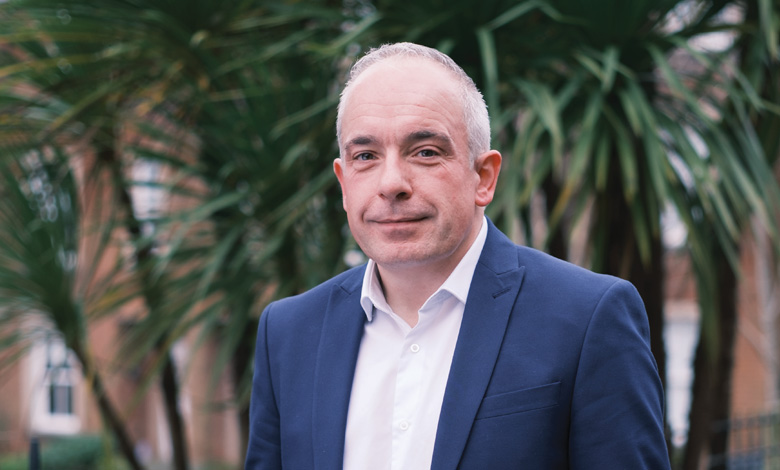
Green hydrogen: A secondary long-term rail fuel option
2nd November 2023
Department seeks legal advice over missed first carbon budget timeframe
29th January 2024A critical gateway to net zero

Managing Director of NIE Networks, Derek Hynes, talks to David Whelan about his organisation’s role in the delivery of a sustainable energy system for all.
Outlining his vision that the transformation of the electricity network will support “a more sustainable and prosperous future” for the region of Northern Ireland, the Managing Director describes NIE Networks’ transmission and distribution network as the “gateway” to delivering on the region’s net zero ambitions.
Over the next decade, Northern Ireland Electricity needs to work with generation developers to make sure it is able to double the amount of renewable generation connected to NIE Networks’ transmission and distribution networks, growing from 1.9GW currently to over 5GW by the mid-2030s.
NIE Networks recently submitted its seventh regulatory price control (RP7) business plan, signalling planned investment of over £2 billion in the electricity network between now and 2031. Hynes believes that “investment and ambitious management of the electricity networks becomes a ‘gateway’ to delivering on Northern Ireland’s net zero ambitions”.
Addressing the context in which NIE Networks is planning for the future, Hynes explains that despite a widespread feeling of political and policy inertia for the region, “sensible progress” has quietly been made in 2023 within the energy sector.
“NIE Networks cannot create a prosperous society alone, but what we can do is play our part through ambitious plans for the electricity network of the future.”
Derek Hynes, Managing Director of NIE Networks
Pointing to progress in several areas, not least the publication of the draft Offshore Renewable Action Plan, the Utility Regulator’s consultation on connection charging policy, and the evolution of the process and rules around the connection of small-scale generation, Hynes believes that key steps are being taken to ensure the right environment is being created for energy to be a positive sector for economic growth and meeting climate targets.
Reach
NIE Networks owns and operates the electricity network consisting of approximately 2,200km of transmission network and 47,000km of distribution network, reaching over 910,000 customers in the form of homes, businesses, and farms.
In November 2023, the Utility Regulator published its draft determination for the RP7 price control for NIE Networks – which sets out new limits on the revenue that NIE Networks can recover from customers to operate their business for the six-year period from 1 April 2025 to 31 March 2031.
Although yet to be finalised, the total expenditure allocation of £2.21 billion is a 16 per cent reduction on NIE Networks’ request of £2.55 billion. However, Hynes is adamant that a collective understanding and acknowledgment of the necessity and opportunity afforded by investment in the network will see continued support for investment in the future RP8 and RP9 programmes.
“The RP7 plan, and the sustained level of investment that we are planning over the next 20 years represents one of the largest ongoing private sector investments in the history of Northern Ireland,” he states.
Discussing NIE Networks’ ability to borrow such sums for investment, Hynes says: “We must be an efficient and competitive organisation so that we can compete for these funds on a global basis and achieve the lowest possible cost of debt for the people of Northern Ireland.
“How the debt market perceives Northern Ireland’s indigenous energy companies when we are seeking these levels of funding is an insight into how Northern Ireland is seen as an investment by the global financial community.”
The Managing Director outlines plans for the majority of the investment to be aimed at increasing the capacity of the existing network. Much of Northern Ireland’s 11kV network has been in place since the 1950s and Hynes says that work is already underway to increase capacity.
“Over the coming years, this entire network will be rebuilt with bigger poles, wires, and transformers so that we can all be confident that the network will be there for us when we can invest in electric vehicles, electric heating, and domestic generation,” he states.
Additional work includes working alongside the System Operator for Northern Ireland (SONI) to rebuild and expand the transmission network, including the modernisation of high voltage substations at the likes of Kilroot and Ballylumford to accommodate growing amounts of renewable generation, and the building of new cluster substations to connect onshore solar and wind generation, particularly in the west and north-east of the region.
Although not included in RP7, Hynes also welcomes critical first steps being taken in the rollout of smart meters in Northern Ireland. In June 2023, the Department for the Economy published a cost/benefit analysis of electricity and gas smart meters, resulting in the development of an implementation plan for electricity smart meters and systems. Describing the move as a “significant milestone” in Northern Ireland’s energy journey, the Managing Director says: “Smart meters, as part of a wider flexible system, have the potential to help drive carbon reduction with improved energy data, increasing flexibility in the electricity system and helping consumers better manage energy efficiency in their homes and businesses.
“They will also allow reform of the electricity tariff system which has been in place for many years which should be a way of making sure that the transition to a net zero energy system is accessible to everyone.”
Reliability
Alongside the push for greater capacity, Hynes explains that a critical component of NIE Networks’ future work is improving the reliability of the network. The Managing Director says that the organisation is committed to ensuring that the people of Northern Ireland can trust the electricity network to be reliable enough to allow them to move towards consuming more electricity, as they replace fossil fuels in their homes and transport.
“This will help to create an environment in Northern Ireland that encourages business to move here and connect to our network knowing that is very reliable and well managed,” he explains.
“The RP7 plan, and the sustained level of investment that we are planning over the next 20 years represents one of the largest ongoing private sector investments in the history of Northern Ireland.”
“The need for investment is clear. Our commitment to doing it efficiently is steadfast, and we hope that the cost to Northern Ireland is reasonable. The process is rigorous, and we welcome that. It will balance the need to keep prices as low as possible, with the equal need for investment.”
Economic opportunity
To fulfil such ambitious plans, Hynes acknowledges that NIE Networks must grow. Currently employing just under 1,500 people, the Managing Director estimates that that figure will need to rise to over 2,000 by 2029, while the number of contractors working for NIE Networks will need to double from 500 to 1,000 in the same period.
Supplementing this growth is NIE Networks’ ambition to grow its apprenticeship intake by 2025.
The Apprentice Academy is open to applications until 11 February 2024. More details can be found on NIE Networks’ website.
Hynes explains that this internal growth is symptomatic of the wider economic opportunities afforded by the push towards net zero and the multiplier effect of early investment.
Setting out that NIE Networks’ investment can help generate economic growth and play a key role in the Department for the Economy’s 10X vision, he highlights the role of the organisation as an enabler of other businesses.
“As we continue to invest in the network, we will also create jobs and qualifications for our people that help support a more sustainable and prosperous future for society. Other businesses also require us to make connections and capacity available as quickly and efficiently as possible.
“As they imagine a fossil fuel-free future, their plans depend on NIE Networks providing the network that they need to support their growth and climate ambitions.”
Hynes believes that by listening to local communities, being as transparent as possible on costs and disruptions, and showing a pathway to economic growth, NIE Networks can continue to enjoy the trust of local communities.
“The electricity network is a part of the fabric of the physical landscape and the work of building and maintaining it requires that we have the people’s trust. Being honest and open with people is vital in maintaining this trust and I hope we can become a more transparent organisation over the coming years.
“This will mean us truly committing to a just transition for those who are vulnerable. Doing our best to listen and respond to politicians, civic, and community representatives, and those who speak on behalf of the economically disadvantaged is more important than ever.
“As we seek to build a new network, we know that the poles and towers that we build will form part of the landscape for generations, and we must work with the communities to make sure that this is done in a way that works for everyone.”
Concluding, Hynes points back to NIE Networks’ role as a key enabler of net zero, amidst an array of stakeholders all seeking to make Northern Ireland a better place to live and work.
“NIE Networks cannot create a prosperous society alone, but what we can do is play our part through ambitious plans for the electricity network of the future. Fundamentally, we want to create a system whereby people can plug in without concern, and in doing so, burn fewer fossil fuels.
“However, we are part of a wider jigsaw working for the people of Northern Ireland. We are a private company, but we work to a public service ethos, recognising that the work that we do not only has environmental benefits but much wider downstream positive economic and societal impacts that can benefit all.
“Spending billions of pounds in Northern Ireland creates economic activity in the local economy. It will contribute to the 10X and the net zero economy. As we continue to invest in the network, we also create the jobs and qualifications for our people that help support a more sustainable and prosperous future for Northern Ireland society.”


